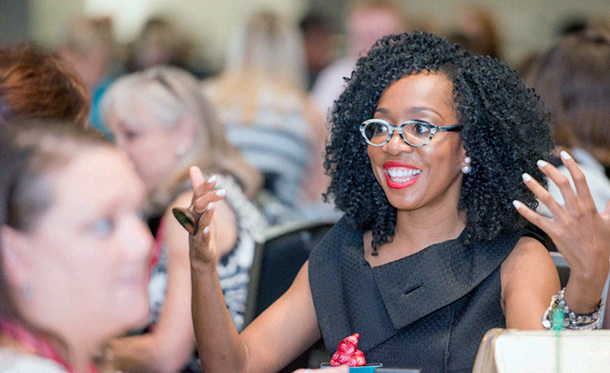As director of product design for the world’s largest ticket marketplace, StubHub, Safia AliWo leads the team accountable for “product experiences” on all digital platforms. And she certainly seems to keep customer experiences at the forefront of her thinking. Is that the future of product design, an arms race of pleasing an increasingly demanding customer base? “It’s not enough to give fans what they expect,” she told us. “We must continually surprise and delight them.”
What is your main goal leading the product design division?
With a fearless team of visual, interaction designers, content strategists, prototypers and researchers, we are elevating design thinking. We’re building relationships with cross-functional teams and partnering to deliver beautiful, easy-to-use and inspiring experiences for StubHub’s global customer base.
How do you prioritize components of that larger goal?
As I see it, we have three top priorities: Creating relevant customer experiences through personalization is the first.
Universally our attention span is much shorter than 10 or 20 years ago. Having a product that can appeal to the senses of the new generation and grab their attention within seconds is essential for brands to be successful. Successful brands have a long term relationship with their customers that exists beyond the transaction and they know their customers well. StubHub’s marketplace has been known for its eCommerce transactions for more than 17 years.

We are evolving our experience to deliver both personalized and relevant experiences that can inspire fans to be there for more live events. Partnering with marketing, engineering and product we are investing in greater personalization to help fans find the events they are interested in and make it easy for them to get there.
Sounds like you are focused on raising the customer experience bar?
Definitely. StubHub is passionate about connecting fans to inspiring event experiences. Everything we do as a company, from our product to our customer service, reflects a deep desire to put fans first.
Fans are looking for experiences that bring them closer than ever before to their favorite athletes and entertainers. It’s not enough give fans what they expect. We’ve got to continuously anticipate their needs, surprise and delight them with the next generation of event experiences.
Shifting from a transactional experience to an inspirational experience requires us to work differently and think differently. Functional isn’t good enough anymore. Changing mindsets to go above and beyond to delight our customers in innovative ways is a big part of my job. This is more than leading my design team. Partnering with engineering, product and marketing to create delightful experiences for our customers is what gets me out of bed to come into work every day.
We’ve heard you say elsewhere that creating a global mindset is key to your team’s success. What do you mean?
StubHub was originally founded in the U.S for the U.S customer base. In 2016, we acquired Ticketbis and now operate in more than 48 countries. This market expansion requires that we embrace a global mindset. A date treatment component must work in many formats and languages; payment methods have to support many partners; and the discovery experience has to be locally relevant using design patterns that appeal locally in each region. Creating a product that is global ready and can be adapted by different countries is a big focus for this year for me.
What new technologies do you see impacting digital product and the wider industry this year?
Voice assistants and Augmented Reality – these might sound like buzz words but I believe there will be a lot more experimentation and adoption in all of these areas. At StubHub we launched an AR experience for SuperBowl this year to help our football fans plan their stadium experience. Most people haven’t been to the city or stadium before.
Using augmented reality, fans on StubHub were able to more accurately visualize where their seats were in relation to the rest of stadium, as well as check out locations of various parking garages and pre-game events in the surrounding downtown area.
I expect lots of companies will experiment in areas to solve customers’ problems in ways that go beyond screen interfaces. People are becoming more comfortable with voice activated interfaces and more companies will invent ways of communicating with their customers, anticipating their needs and providing relevant solutions without having them to interact with screens.
As a brand that operates across multiple devices and touchpoints, how are you aiming to solve any customer pain points and improve the customer’s cross-platform journey?
Being multi-platform is table stakes now.
As a tech company, we want to build experiences in a way that power multiple platforms at the backend but the front end adapts to the capabilities of the platform and uses the differences in platforms to make our customers lives better. For example, we have mobile check-in in our apps and wearables but not in desktop experiences. We solve different pain points through different channels based on customer needs. Our product managers and designers follow our customers and observe the end to end journey and constantly innovate with the latest technology to solve customer pain points.
As a speaker at this year’s Open Mobile Summit, what are you hoping to learn and take away from the summit?
Besides networking, it’s fun to see how other industries are solving customer problems. Day to day I am so immersed in my own industry so I enjoy seeing how other brands are solving customer problems and learning from them. There is a whole spectrum of industries, from beverages to hospitality to dating and finance, which I find very energizing.

